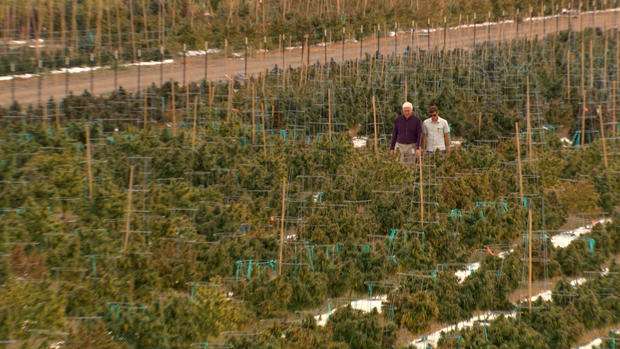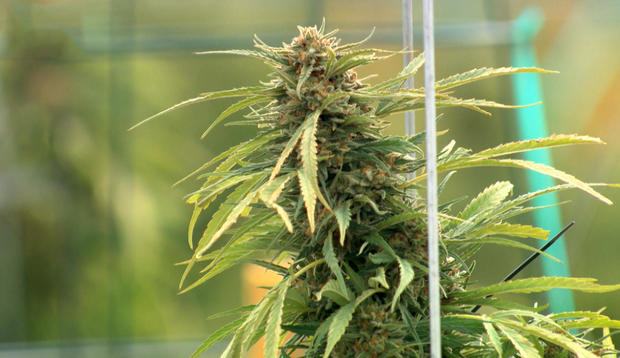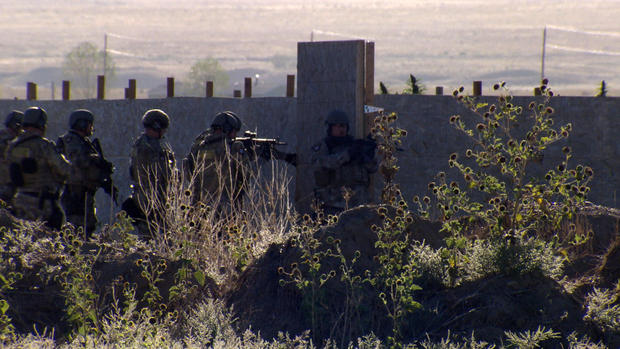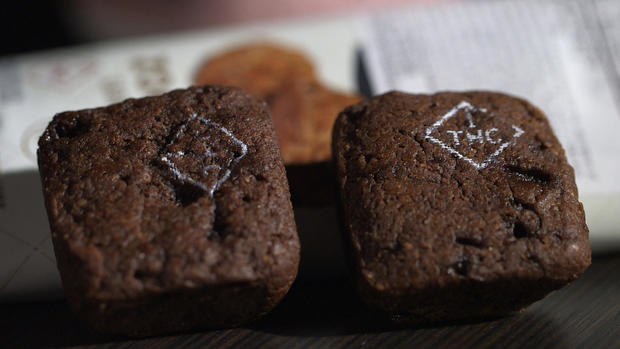The Pot Vote
The following script is from “The Pot Vote,” which aired on Oct. 30, 2016. Dr. Jonathan LaPook is the correspondent. Katherine Davis, producer.
Five percent of Americans live in states where pot is legal for recreational use. But by next Wednesday, that percentage could swell to almost 25 percent. It’s on the ballot in five states: California, Massachusetts, Maine, Arizona and Nevada. If it passes in those states, it would reflect a significant shift in attitudes. The latest poll shows more than half of Americans favor legalization. The state with the most experience with legal recreational pot is Colorado, which allowed retail sale of the drug starting in 2014. No other state has gone further or faster into the legal weed business. But it’s still in its infancy and remains an experiment. So with next week’s vote in mind, we went to Colorado to find out what’s working and what’s not.
This county in southern Colorado has been called the “Napa Valley of cannabis” for a reason. No community has felt the impact of legalization more powerfully than Pueblo. A former steel town of 160,000 residents, it is now home to over 90 pot-growing facilities. This is the heartland of legal marijuana in America, and it goes on as far as the eye can see.
Jon LaPook: This is enormous, how big is this?
Bob DeGabrielle; We have 36 acres here and there is 21,600 plants between all the four licenses.
Jon LaPook: 21,600 plants. That’s a lot of plants.
Bob DeGabrielle is a founder of this industrial-scale enterprise, which he runs with his 27-year-old son Ketch. Just three years ago, he was a real estate developer from North Carolina. Now he owns Los Suenos Farms, the largest recreational cultivation facility in the country.
Jon LaPook: How did you get into the marijuana business?
Bob DeGabrielle: Came out and looked at it from an investment standpoint, then just decided to stay out here. Realized that Colorado was really the epicenter of what was happening in the industry.
Bob and his partners have invested $10 million in Colorado’s tightly regulated industry, which requires that every plant grown by a licensed operator be entered into a database, outfitted with a radio frequency tag, and tracked from seed-to-sale. This is high-tech, high-security retail cultivation, where 289 cameras track every plant and 22,000 pounds of marijuana are harvested a year, then cured in barrels like wine.
Jon LaPook: Where does it go from here?
Ketch DeGabrielle: So from here, it will go through our trimming machines and we’ll trim it.
It will also be inspected by the state for quality control. At Los Suenos Farms, they are on track to rake in about $20 million-a-year in this budding industry, and they say it has been very good for Pueblo County too.
Bob DeGabrielle: In so many ways it’s been an economic windfall for the community.
Marijuana has created 1,300 jobs and more than 60 businesses in Pueblo. There are 85 employees at Los Suenos and they all have to pass background checks and be fingerprinted. But while five U.S. states will have legalization of recreational marijuana on the ballot, this Colorado county is considering restricting it. On Election Day, voters in Pueblo will decide whether the county should opt-out of the production and sale of recreational pot. That would force Los Suenos Farms out of business within a year.
Jon LaPook: How would that affect you financially?
Bob DeGabrielle: Oh it would be devastating in terms of the amount of money that we’ve put in here and the time that we’ve put in here.
Ketch DeGabrielle: Making it illegal here does absolutely nothing to get cannabis out of here. It just means you have to drive to the next county to purchase it.
When recreational marijuana was legalized in Colorado, most counties chose not to allow the production or sale of it. Pueblo did, and there have been both profits and problems ever since.
Steven Simerville: It’s affecting the emergency room, it’s affecting the operating room, it’s affecting just about every aspect of medicine that you could think of.
Dr. Steven Simerville is a pediatrician, and medical director of the newborn intensive care unit at Pueblo’s Saint Mary Corwin Medical Center. He supports the ballot initiative to ban recreational pot, in part, because he says he’s noticed more babies being born with marijuana in their system. His observations are anecdotal but he’s concerned by what he has seen in his own hospital. In the first nine months of this year, 27 babies born at this hospital tested positive for THC, the psychoactive ingredient in marijuana. That’s on track to be about 15 percent higher than last year.
Jon LaPook: When was the last time you took care of a baby who tested positive for marijuana?
Steven Simerville: I have babies up on the unit right now who are positive for…
Jon LaPook: Right now?
Steven Simerville:…for marijuana.
Jon LaPook: And when were they born?
Steven Simerville: All of them were within a week.
Jon LaPook: What does the mother say when you say “your baby’s just tested positive for marijuana and it can possibly harm the baby” – what does the mother say?
Steven Simerville: They’re not surprised that it. They’re tested positive. Obviously, they know they’ve been smoking marijuana, but they’re in disbelief that it’s harmful. They frequently say, “How can it be harmful? It’s a legal drug.”
Dr. Simerville says that’s a common misconception, especially because 25 states have approved marijuana for medical use; for conditions like epilepsy, pain and stimulation of appetite. But on the federal level, it’s still illegal. Today’s pot is on average four to five times stronger than it was in the 1980s. It can also get passed on to babies in high concentrations in breast milk.
Steven Simerville: I try to explain to them that even though you’re not smoking very much, the baby is getting seven times more than you’re taking and that there’s-- this drug has been shown to cause harm in developing brains.
Research suggests babies exposed to marijuana in utero may develop verbal, memory and behavioral problems during early childhood.
Steven Simerville: You need to be able to protect babies. And you’re gonna need to protect teenagers. And by “teenagers,” who are developing brains, you have to take in mind that marijuana potentially permanently affects brain growth until people are 25 or 30.
In the first 10 months of this year, 71 teenagers came into the emergency room at this hospital with marijuana in their system, which is on track to be about 70 percent higher than last year. That worries Dr. Simerville because evidence is emerging that heavy teenage use – using 4 to 5 days a week – may be linked to long-term damage in areas of the brain that help control cognitive functions like attention, memory and decision-making. It’s not known if there’s any amount of marijuana that is safe for the developing brain, which may still be maturing during the mid to late 20s.
Law enforcement officers in Pueblo County believe they too, are seeing more marijuana related problems.
Kirk Taylor: They said the black market will disappear. Well I can tell you the black market is alive and well and thriving. In fact, its exploding.
Sheriff Kirk Taylor is aggressively tackling a problem known as “illegal homegrows.” Criminal organizations are coming to Colorado to grow marijuana illegally for out of state diversion. Sheriff Taylor says they had 1-2 busts a year before recreational marijuana was legalized. In the last six months, they’ve had 36.
Kirk Taylor: Who’s behind the illegal grows? Different groups of folks. Cuban nationals from Florida. We’ve busted Russians from NY. The pattern that they’ve shown here in the last six months is they’ll come in and buy a home or rent a home or a series of homes. And they’ll set up grows in those homes whether it be in the garages, in the out-buildings, very sophisticated. They’re hot-tapping into the existing electrical grids.
We were with Sheriff Taylor in Pueblo as SWAT team members and federal Drug Enforcement Agents gathered before dawn to stage one of the largest illegal homegrow busts in the country.
More than 150 deputies and agents armed with 13 search warrants were preparing for a coordinated strike. The target of the day’s raid was a drug cartel from Southeast Asia, suspected of converting 10 rental homes into grow operations that are hiding in plain sight.
Jon LaPook: So the feeling is this is organized crime here?
Kirk Taylor: Absolutely.
Jon LaPook: This is not a 1 or 2 person operation?
Kirk Taylor: No this is not a Mom and Pop – “let’s grow a little weed.” This is organized crime.
This raid was three months in the planning and came with heavy artillery. It netted a number of suspects and resulted in the seizure of more than 22,000 pounds of marijuana plants in all with a potential value of over $7 million. That amount is doubled if it’s sold out of state but these plants will be destroyed.
Illegal grows like this are not the only problem cops here are facing. Some people are getting high then getting behind the wheel and there is currently no field sobriety test in use that is the equivalent of the breathalizer for alcohol though Colorado police are experimenting with roadside oral swab tests.
Marilyn Huestis: There’s huge differences between alcohol and marijuana and that’s one of the things the public really needs to understand is they think “Well, we can take all the rules and everything we’ve set up for alcohol and just transfer them over.” And they can’t do that.
Dr. Marilyn Huestis, former chief of chemistry and drug metabolism at the National Institute on Drug Abuse, has been studying marijuana’s effects on the human body for more than 25 years.
Marilyn Huestis: When you take alcohol, it has its effects and then it leaves the body. When you take cannabis, it gets into the tissues of your body and is stored.
Jon LaPook: It can be stored in the fat?
Marilyn Huestis: It’s stored in the fat.
Jon LaPook: How about the brain?
Marilyn Huestis: And the brain is a very fat, fatty tissue and so we know that it’s still in the brain when you can no longer measure it in the blood.
So far, Colorado hasn’t seen a huge spike in driving while high or in marijuana abuse by teens. But the data is still being collected on pot’s overall impact on the state.
All these issues sit on the shoulders of Governor John Hickenlooper, who was originally against the legalization of recreational marijuana.
John Hickenlooper: My biggest concern is that we’re not collecting data. And what I’ve told other governors is don’t wait for the laws to change. Start collecting baseline data now. How many kids are using marijuana? Start looking in accidents – was there THC involved? So that we really have good baselines so that we accumulate more data if they do legalize it, we can see what the effects of legalization itself really are.
They are already learning from some early mistakes. After a number of people overdosed on marijuana edibles, Colorado implemented new rules, limiting the amount of THC in products, and requiring new labels detailing the potency of each serving.
On the positive side, Governor Hickenlooper says last year revenue from marijuana brought in $141 million in taxes, and he’s encouraged that arrests for possession are down almost 50 percent since 2012.
John Hickenlooper: No one can argue the old system wasn’t a disaster. We had an old system where kids had open access to marijuana and everything was black market. There was no regulation. There was all illegal activity. We were creating whole generations of kids that were growing up thinking that to break the law and make money selling drugs was perfectly fine. That’s what we’re trying to fight against.
Jon LaPook: Is it fair to say this is tricky?
John Hickenlooper: It is fair to say this is more than tricky. This is about the hardest, most complicated thing in public life that I’ve ever had to work on.
Jon LaPook: Five states have recreational marijuana on the ballot.
John Hickenlooper: I know.
Jon LaPook: What kind of advice are you giving them?
John Hickenlooper: I urge caution. My recommendation has been that they should go slowly and probably wait a couple of years. And let’s make sure that we get some good vertical studies to make sure that there isn’t a dramatic increase in teenage usage, that there isn’t a significant increase in abuse like while driving. We don’t see it yet but the data is not perfect. And we don’t have enough data yet to make that decision.
Jon LaPook: So you’re not confident yet that we really know what’s going on yet to say “go ahead, legalize”?
John Hickenlooper: Right, not without certainty. I feel confident enough now that I’m not trying to turn the clock back. Even with all the problems we have and the challenges. I think we might be able to do this. But I’m not so confident that I’m telling the other states, “Yeah, go for it. This is gonna be – this is a slam dunk.”




